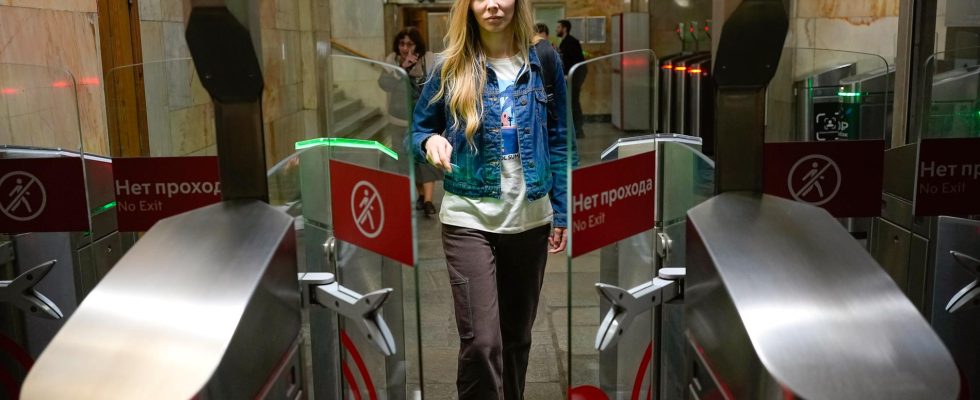1 of 3 Photo: Alexander Zemlianichenko/AP/TT
In one year, Moscow resident Yekaterina Maksimova has been arrested five times. Now she avoids the subway and its surveillance cameras – no matter how fast she is.
In Vladimir Putin’s Russia, the state has eyes almost everywhere. After the invasion of Ukraine, the Russian surveillance community has exploded.
One by one they pop up – the little white cameras. Now you see them almost everywhere: in Russian public transport, on lampposts, in schools, at the entrances to residential buildings.
The cameras are connected to an advanced recognition system called Orwell – a reference to the British author George Orwell and his classic “1984”, in which the population is under constant surveillance by a totalitarian state in a so-called Big Brother society.
Yekatarina Maksimova has been arrested before: in 2019 in connection with a demonstration in Moscow and in 2020 because of her climate activism. Since then, the surveillance cameras “react” to her face, and she has been arrested five times in the past year.
– It seems that I am included in some kind of database, she says to the news agency AP.
Tracking down gun resisters
Russia under Vladimir Putin has acquired advanced digital technology aimed at tracking, censoring and controlling the population, several human rights organizations and international observers claim. In recent years, the Kremlin has built up a sophisticated system, called by some a “cybergulag” – a dark allusion to the system of prison and labor camps where millions of people were kept incarcerated during the Stalin era in particular.
Initially, the cameras were said to be used to track and fine Russians who violated restrictions related to the covid pandemic. But it soon became clear that it was not the whole truth.
When protests against the jailing of Kremlin critic Alexei Navalny erupted in 2021, the system was used to identify and arrest protesters – in some cases several weeks after the demonstrations. After President Vladimir Putin’s mobilization order for the Ukraine war last year, the cameras are said to have also helped the authorities call in gun refusers.
Bank data is collected
In Moscow alone, there are now 250,000 surveillance cameras with advanced AI technology. Similar systems exist in a number of larger cities, including St. Petersburg, Novosibirsk and Kazan, AP writes.
According to a number of observers, the Russian regime appears to be well on its way to creating a state system based on total digital surveillance, coercive means and punishment.
“In 2022, Russian authorities expanded their control over people’s biometric data, including by collecting data from banks and using facial recognition technology to monitor and prosecute activists,” Human Rights Watch reported earlier this year.
Record-breaking censorship
The Kremlin also increasingly monitors and controls the activities of Russians on social media. It is about blocked sites, mobile operators being forced to share call lists and text messages with the authorities, as well as large companies such as Google, Apple and Facebook being pressured to store user data on Russian servers.
Following Russia’s February 2022 invasion of Ukraine, censorship and prosecution of social media posts skyrocketed. More than 610,000 sites were blocked or removed by Russian authorities last year. 779 people were prosecuted for posts and comments published online, which was a record. Most of them allegedly contained anti-war messages or “false information” about the war, AP writes.
“This cyber gulag, as it was called during the pandemic, is now taking shape for real,” writes political analyst Tatiana Stanovaya at the Carnegie Endowment for International Peace think tank.
FACTS
Putin’s surveillance since the invasion
In November 2022, President Vladimir Putin ordered the government to create a digital registry of Russians of fighting age. The register is expected to mean that digitally conscripted Russians who do not report for duty can neither leave the country nor buy or sell real estate, and risk having their driving licenses revoked.
In December 2022, a law was hammered out that forces taxi companies to share their databases – and thus all information about customers’ travel habits and payment details – with the Russian security service FSB.
In December 2022, Putin ordered the FSB to expand surveillance of both Russian society and the country’s borders to “identify traitors, spies and dissidents.”
In April 2023, a bill was introduced to find and monitor former Ukrainian citizens in Russia.
Sources: AP, Meduza.
Read more
